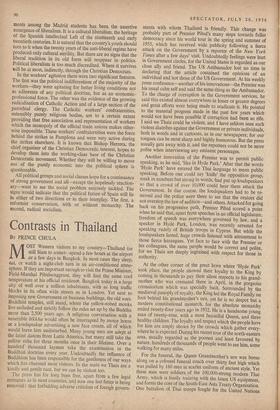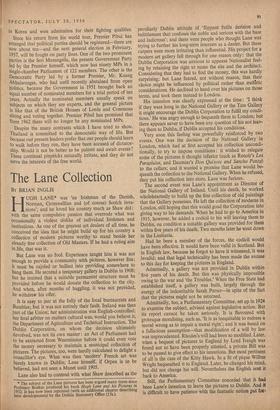Contrasts in Thailand
BY PRINCE CHULA MOST Western visitors to my country—Thailand (or still Siam to some)—spend a few hours at the airport or a few days in Bangkok. In most cases they sleep, eat, or watch .a night-club turn in an air-conditioned atmo- sphere. If they are important enough to visit the Prime Minister, Field-Marshal Pibulsonggram, they will find the same cool temperature at his official residence. Bangkok today is a large city of well over a million inhabitants, with as long traffic blocks in its often wide streets as in London. Yet next to imposing new Government or business buildings, the old was, Buddhist temples, still stand, where the yellow-robed monks live secluded and strictly follow the rules set up by the Buddha more than 2,500 years ago. A religious conversation with a venerable bikkhu would often be interrupted by motor horns or a loudspeaker advertising a new face cream, all of which would leave him undisturbed. Many young men are adept at the latest dances from Latin America, but many still take the yellow robe for three months once in their lifetime. Over a hundred' thousand laymen take the examination in the Buddhist doctrine every year. Undoubtedly the influence of Buddhism has been responsible for the gentleness of our ways. which has charmed most visitors. In the main we Thais are a kindly and gentle race, but we can be violent too.
The press has for long been free, apart from a few legal restraints as in most countries, and now one last fetter is being removed : that forbidding adverse criticism of foreign govern- ments with whom Thailand is friendly. This change was probably part of Premier Pibul's many steps towards fuller democracy since his world tour in the spring and summer of 1955, which has received wide publicity following a fierce attack on the Government by a reporter of the New York Times after a few days' visit. Undoubtedly feelings were hurt in Government circles, for the United States is regarded as our close ally and friend. The US Ambassador lost no time in declaring that the article contained the opinions of an individual and not those of the US Government. At his weekly press conference—another of his innovations—the Premier was his usual calm self and said the same thing as the Ambassador. To the charge of corruption in the Government services, he said this existed almost everywhere in lesser or greater degrees and great efforts were being made to eradicate it. He pointed to the material progress made in the past few years which would not have been possible if corruption had been so rife. I said we Thais could be violent, and I have seldom seen such violent diatribes against the Government or private individuals, both in words and in cartoons, as in our newspapers: for our tongues can be most sharp and highly humorous. But the press usually gets away with it, and the reporters could not be more polite when interviewing any eminent personages.
Another innovation of the Premier was to permit public speaking, as he said, 'like in Hyde Park.' After that the words 'Hyde Park' have entered the Thai language to mean public speaking. Before one could say 'knife' the opposition group, weak in numbers but strong in words, had put up loudspeakers so that a crowd of over 10,000 could hear them attack the Government. In due course, the loudspeakers had to be re- moved and the police were there to see that the orators did not overstep the law of sedition—and others. Attacked for going back on his progressive path, Premier Pibul scored a point when he said that, apart from speeches in an official legislature, freedbm of speech was everywhere governed by law, and a speaker in Hyde Park, London, was recently arrested for speaking rudely of British troops in Cyprus. But while the loudspeakers lasted, huge crowds listened with amusement to those fierce harangues. Yet face to face with the Premier or his colleagues, the same people would be correct and polite, for we Thais are deeply ingrained with respect for those in authority.
At the other corner of the great lawn where 'Hyde Park' took place, the people showed their loyalty to the King by coming in thousands to pay their silent respects to his grand- mother who was cremated there in April, in the gorgecius crematorium which was specially built. Surrounded by the medieval panoply of royalty, the King led the Royal Family on foot behind his grandmother's urn, yet he is no despot but a modern constitutional monarch, for the absolute monarchy ended twenty-four years ago in 1932. He is a handsome Stoung man of twenty-nine, with a most beautiful Queen, and three healthy children. The loyalty and respect which the people have for him are amply shown by the crowds which gather every- where he is expected. During his recent tour of the north-eastern area, Usually regarded as the poorest and least favoured by nature, hundreds of thciusands of people went to see him, some walking for many miles.
For the funeral, the Queen Grandmother's urn was borne along on a colossal funeral coach over thirty feet high which was pulled by 160 men in scarlet uniform of ancient style. Yet these men were soldiers of the 100,000-strong modern Thai Army, which is busily training with the latest US equipment, and forms the core of the South-East Asia Treaty Organisation. One battalion of Thai troops fought for the United Nations in Korea and won admiration for their fighting qualities.
Since his return from his world tour, Premier Pibul has arranged that political parties should be registered—there are now about ten—and the next general election in February. 1957, will be fought on party lines. One of the two prominent Parties is the Seri Manangsila, the present Government Party led by the Premier himself, which now has ninety MPs in a single-chamber Parliament of 122 members. The other is the Democratic Party led by a former Premier, Mr. Kuang Abhaiwongse, who had until recently abstained from open Politics, because the Government in 1951 brought back an equal number of nominated members for a trial period of ten Years. Actually the nominated members usually speak on subjects on which they are experts, and the general picture is like that of the British Houses of Lords and Commons sitting and voting together. Premier Pibul has promised that from 1962 there will no longer be any nominated MPs.
Despite the many contrasts which I have tried to show. Thailand is committed to the democratic way of life. But because our present leaders prefer that our people should. learn to walk before they run, they have been accused of dictator- ship. Would it not be better to be patient and await events? These continual pinpricks naturally irritate, and they do not serve the interests of the free world.



















































 Previous page
Previous page